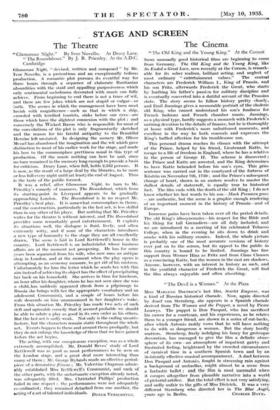"The Devil is a Woman." At the Plaza Miss MARLENE
Dirrasca's last film, Scarlet Empress, was a kind of Russian historical charade. Now, again directed by Josef von Sternberg, she appears in a Spanish charade derived from The Woman and the Puppet, a novel. by Pierre Louwys. The puppet is Don Pasqua], who has sacrificed his career for a courtesan, and his experiences, as he relates them to a younger friend, are shown in a series of cut.-backs, after which Antonio rashly vows that he will have nothing to do with so dangerous a woman. But the story . hardly matters. Sternberg, freely indulging his fancy for grotesque decoration, has managed to give the film a definite atmo- sphere of its own—an atmosphere of impatient gaiety and frustrated feeling, heightened by the crowded circumstances of carnival time in a, southern Spanish town and by an insistently effective musical accompaniment. A duel between Don Pasqual .and Antonio, :fought in streaming rain against a background of umbrellas,. might almost be a . scene from a fantastic ballet and the. film is most successful. when it escapes altogether from plausible .narrative into a world of pictorial artifice. But the total effect is not very satisfying; and sadly unfair to the gifts of Miss Dietrich. It was a very. different Sternberg who directed her in The Blue Angel;


































































 Previous page
Previous page